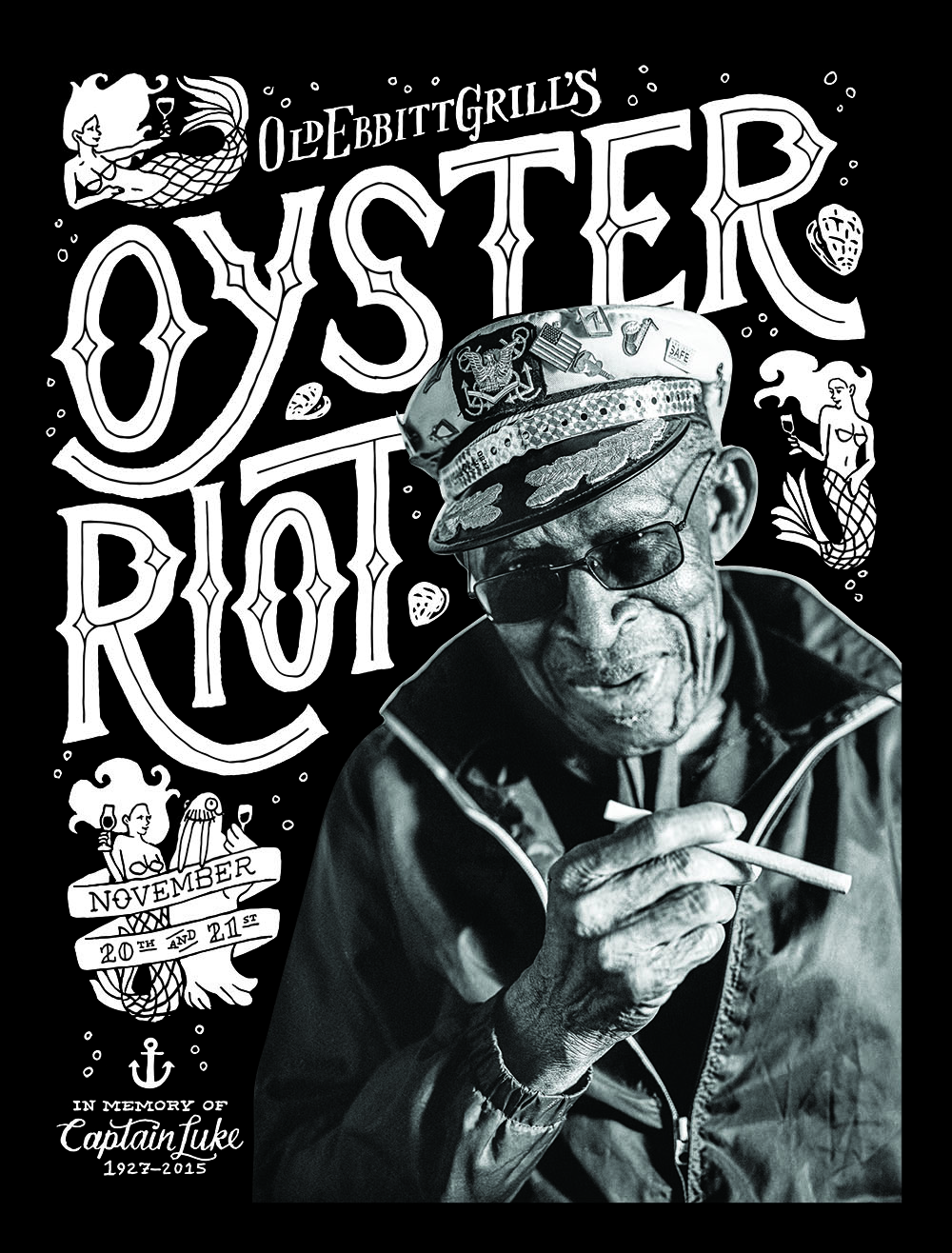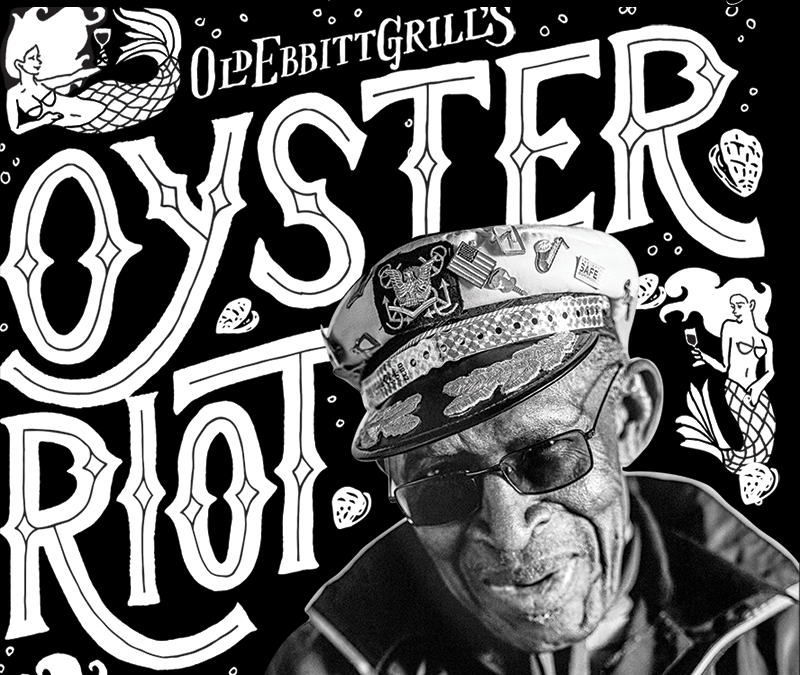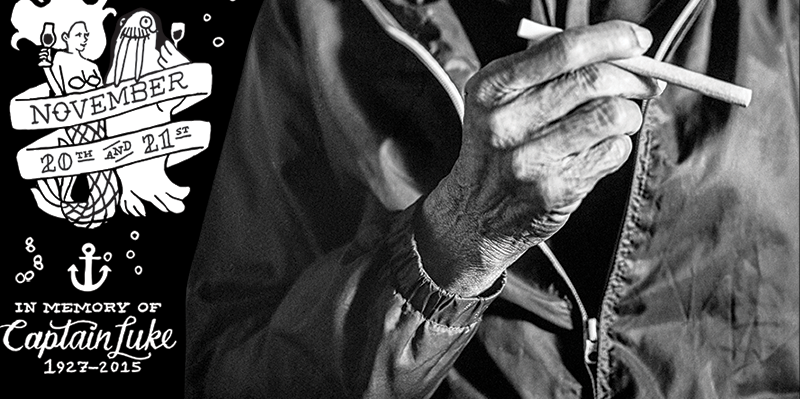
Oyster Riot 2015
18" X 24" Poster - $15
Luther Mayer, known as “Captain Luke,” was born in Greenville, South Carolina, in 1927. He grew up on his grandparents’ farm in nearby Clinton, where he followed the furrows barefoot behind the plow as his Uncle Jesse worked and sang to his mule. Luke’s ambition at the time was to learn to drive a mule. It was one he never achieved, but he soaked in the music of the countryside as Jesse played his harmonica on the evening porch. At 14, he moved to Winston-Salem, North Carolina, with his mother and sister, where the exigencies of the situation carried him increasingly out of school and into the work force. At 17. he went to work for LaSalle Bell, a junkman who demanded a day’s work from his young employee. LaSalle was a large man and Luke soon learned to lift his own end of a scrap motor and heave it onto a flatbed truck without pause or complaint. Early on he had developed a talent for imitation, and Luke began to sing the songs he heard on the radio, everything from the big band singers to hillbilly ballads. (“Back then I had eleventeen voices.”)
Luke was blessed with a deep natural baritone. He was accustomed to carrying the low parts in church, and his abilities soon caught the attention of Otis King, who taught him how to hold the low notes and make them rise and fall. Soon Luke was singing bass professionally in King’s Gospel Quintet. He also began to entertain at informal gatherings, an avocation that would endear him to friends and strangers alike throughout his life. Accompanied by whatever instrumentation available, Luke would travel in a wide circle from Winston performing in drinkhouses, the social hubs of the African-American community in the North Carolina Piedmont. His repertoire changed with the popular music of the changing times and grew to include comedy routines, notably renditions of Amos’n’Andy skits with inflection-perfect renditions of every character. He worked continually, raising four girls and two boys in Winston-Salem. In 1969 he moved to New York City and worked for four years in the garment industry until called back to Winston for a family emergency. He remained there until his passing.
A chance encounter in the early seventies led to a long association with Guitar Gabriel. Gabe was a master of the country blues, another musical form that suited Luke’s voice perfectly, and the two became fixtures in the Winston-Salem drink-house scene, providing a nucleus of entertainment in their community, alongside such local luminaries as Macavine Hayes, Whistlin’ Britches, Willa Mae Buckner and Mr Q. Sometime early in this period an admiral’s hat caught Luke’s eye in Miller’s Variety Store and he became in an instant Captain Luke. Although completely unfamiliar with boats, Luke was a leader of men by anyone’s standards: the handle fit and it stuck.
Captain Luke’s body was sculpted by a lifetime at labor. His formative years under the scrap metal tutelage of Mr. Bell built biceps that fifty years later swell forth from his sleeveless shirt like a young athlete’s. The thick roped muscles of his arms ripple as he would lift a thin cigar from his mouth, then relax as his arms hang loose, almost akimbo, and his dark face cracks into a wide smile. “I’ll tell you what I think about the president. He’s a man isn’t he? She put that thing right out in front of him. I don’t care if he had two wives, I’d have done the same thing. ” Answers to questions come easily to Luke. His uncommon combination of youthful demeanor and ancient wisdom are perhaps born of his direct approach to the contingencies of everyday life. His is the yoga of a man who has worked hard, played hard, and slept well, and his terse evaluations of the situation leave little room for doubt or argument.
Luke’s music and art were rooted firmly in the African-American working class of the Carolina Piedmont and the mystique of his message referred continually to the blues experience. However, as a pure entertainer in the milieu of the drink-houses, Luke’s style and song selection periodically changed to suit the needs and desires of his audience. The average blues consumer, (at the moment predominately white), naturally supposes these to be the standard popular forms of the ‘30s and ‘40s. In the real world, the community has its own criteria. In his collaboration with guitar wizard John Ferguson, Luke explored the broad ranges of the idiom, from its roots in the deep country, (let it not be forgotten that Country music has borrowed heavily from African-American formats) all the way to its modern pop/showbiz manifestations. From the primitive nursery rhyme “Old Black Buck” to more familiar sounds of Lightnin’ Hopkins and Guitar Gabriel, through the rythm’n’blues of Joe Simon, to the sentimental songs of Billy Eckstein and last great master of the genre Brook Benton, Luke’s rich dry baritone provided a panoramic tour of his musical influences and arrived at an unusual convergence that might be called Outsider Lounge Music. This Outsider Lounge Music sound is basic and sophisticated in the same moment, speaking to us with the savage perspicacity of Satchmo in his prime and swinging with the easy grace of a young Dean Martin.
Luke’s art exhibited the same eclecticism as his song bag. From a day decades ago that a glistening beer can by the roadside spoke to him of beauty and function, hefashioned homemade ashtrays, lamps, airplanes, and cars from society’s debris. Ubiquitous in the knick-knack shelves and card tables of his Winston-Salem neighborhood, they have become sought-after pieces in the folk-art collector’s market.
Captain Luke passed peacefully on May 12, 2015.
We thank him for his contributions to music and the Oyster Riot. Rest in peace dear friend.

|

